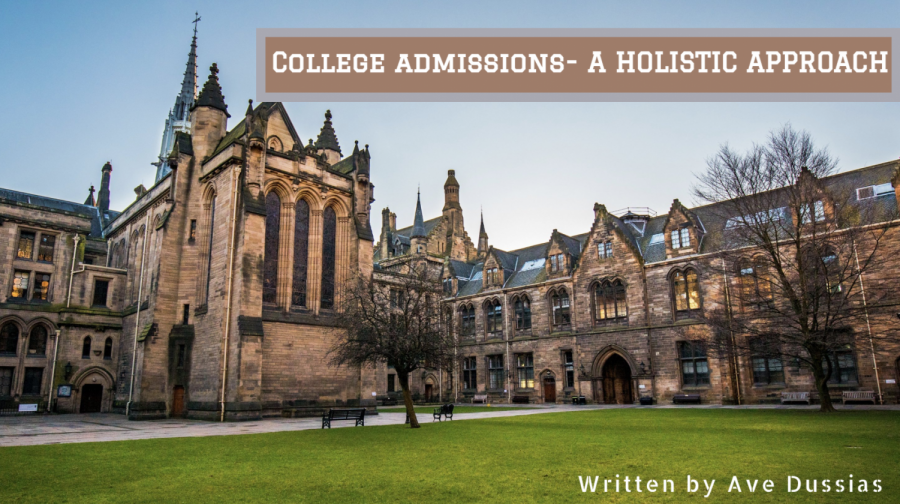College Admissions- A Holistic Approach
November 9, 2021
It is that time of year again when high school seniors all over the world are reaching the most stressful point of their four years; the dreaded college application process. Since their freshman year, many kids already have their list of colleges started and have a general idea of what profession they want to study. This is a great step, but is only a fraction of starting your college career. The most important is the application.
The Deans of Admissions from Brown University, Vanderbilt, and the University of Chicago hold informative sessions around the country giving guidance on how to apply to their colleges and how they and other highly selective universities determine who they accept. I was lucky enough to attend one of these sessions earlier this month and I have chosen to share the message since it really helped me get an idea of what colleges look for.
Factors Behind College Admittance:
The admissions process in the United States, specifically for the colleges mentioned previously, very much includes what you are like as a person. It is a term referred to as “holistic admissions.” This admittance practice takes into account other factors other than just test scores and GPA.
Don’t be mistaken, grades are still a vital factor when applying to a school. In the Dean’s Session, they noted that you should not apply to a school that has a much higher grade range than what you have. But just because you have the sought after grade for the school, it is not guaranteed that you will attend it. The same thing goes for testing scores. Even if you have the best ACT and SAT scores, that does not grant you automatic admission. Mostly every other individual applying to that school is in the same range.
Schools like Brown, Vanderbilt, and the University of Chicago are currently using a test optional policy. This means that they do not require your ACT or SAT scores to be accepted. Colleges understand that a student can be highly intelligent but lack test taking abilities. Ultimately, this is why these test scores are not a determining factor. If test taking is a problem that you may be facing, consider looking into colleges that have the test optional policy and apply to them. It can work in your favor since they still admit test optional students. It should be noted though that if you have a test score not in the range of a specific school, do not submit that test score. That will not do you any good. If that is the case and it is a test optional school, opt out on submitting your results. If it is a test required school, possibly consider going elsewhere.
The Role of Current Financial Status:
Another factor that the Deans mentioned was financial status. These three schools, along with multiple others, do not discriminate towards those in a lower class family. If there is an applicant who comes from a very wealthy family and will not require any financial aid to put them through school, they will not be at an admittance advantage to an individual who will need their tuition mostly covered by financial aid.
You should also never be afraid to apply for financial aid. Over half of the students attending these schools receive some allotment of financial support from the school. It would be regretful to not apply to a school thinking you would not qualify for any aid, or being embarrassed to apply for aid, when it is very plausible to receive that help. The majority of students take advantage of it. That is why it is beneficial to take a look at the financial aid statistics of a school.
Consideration of Advanced Courses:
Here at MIA it is a well known fact that we do not have AP courses offered, but the Cambridge AICE curriculum instead. Going into the meeting I was worried that those taking AP classes were at an advantage since that is a more widespread and popular system. I expressed my concern with the Dean of Admissions of the University of Chicago, Jim Nondorf, and he said that AP has no advantage over AICE classes. He described how colleges look at how you took advantage of the opportunities that your high school provided for you, not necessarily what was provided. If all your school offered was AICE, they take note of how many classes you took out of all they offered and how well you did in those classes. The same goes for AP.
The number of higher level courses you take in high school compared to how many other applicants do does not necessarily determine which one of you will be accepted. This is another part of holistic admissions. Many colleges look into the context of how many courses a school actually offered and how many of the courses that were accessible to you you actually took. The example mentioned at the conference was if a student took 5 AP classes but had 20 APs offered at their school, they will not have a higher chance of being accepted than a student who only took 4 AP classes but their school only offered 6 AP courses. Just because you took more does not mean you will look better to the admissions officer.
Impact of Extracurriculars & Essays:
Another very important topic discussed was extracurriculars. One of the biggest points mentioned was that part of your application for extracurriculars requires you to document what year you started that activity. This means that they take into account when students in their senior year join a large number of clubs just to try to lengthen their list and look better. This is frowned upon and will not be taken well by the admissions officers.
It is also not taken well when a student has every single club under the sun on their transcript. Colleges look at how you have put yourself into something you are passionate about or into something that will help you with what you will try going into a profession of. When they see a whole list of clubs that do not have any correlation, they will think you joined all of these clubs with the sole purpose of trying to look good for college, not for shaping yourself.
If you have an activity outside of school that occupies a large amount of time, it is good to include that in your application. An example that the conference used was if you take care of little siblings, grandparents, or have a job. Some schools will count that as an extracurricular since it is something not required that you have a responsibility in. It also shows a work ethic that colleges look for. Sometimes work or taking care of people consumes all of their time so there is no room for school associated extracurriculars in their schedules. Colleges understand this.
One of the final topics discussed was everybody’s favorite, the essays. Colleges do not want to read an essay where you are talking yourself up. It will not make you seem accomplished in the admissions officers eyes, but it will make you come across full of yourself. Admissions also does not want to see a repeat of everything in your transcript. They just want you to answer their prompt exactly. One final thing, while it may seem obvious, make sure not to submit another school’s essay prompt to a different school thinking you can make it work for their prompt. Colleges know each other’s prompts so you will be the laughing stock of the entire admissions office.
Conclusion:
It is important to remember that the admissions officer reviewing your application is a normal human after all. It is not a randomized algorithm that would unjustly rule out your candidacy. You are also a normal human, so it is important to show exactly who you are on your application.







